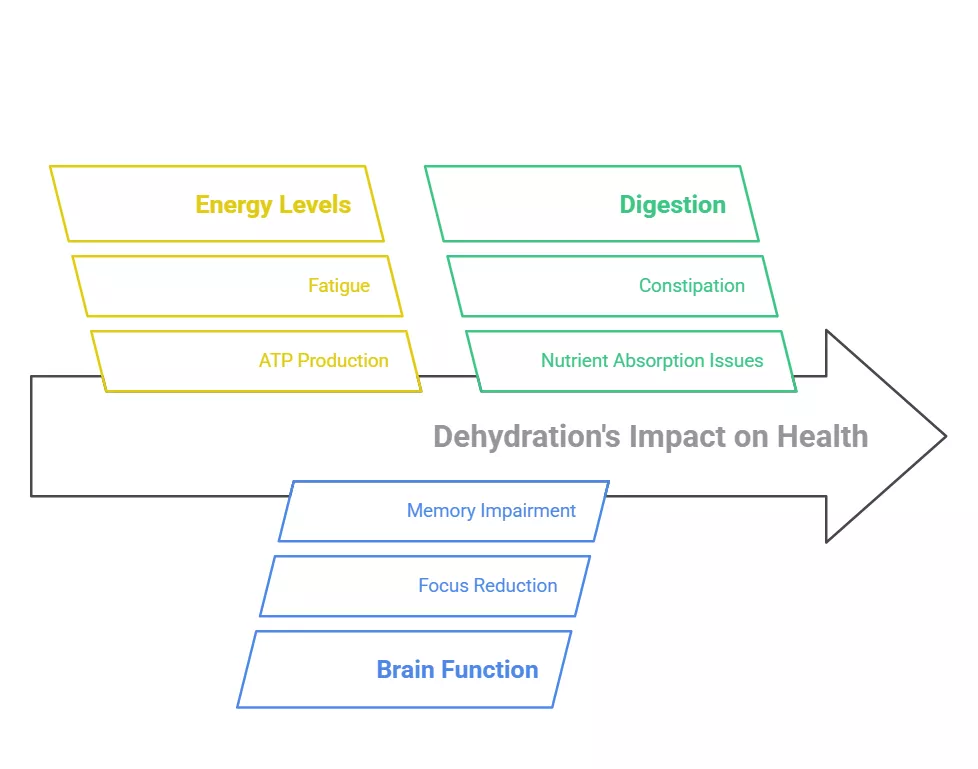We’ve all heard the advice: “Drink more water!” But did you know that staying hydrated isn’t just about quenching thirst—it’s directly tied to your metabolism and even your weight? In our previous article, Why Staying Hydrated is Key to Boosting Your Metabolism we explored how water fuels your body’s calorie-burning engine. Now, let’s dive deeper into the surprising ways dehydration can slow your metabolism and derail your health goals—from temporary weight loss tricks to long-term weight gain.
What Is Water Metabolism? (And Why It Matters)
Your body is 60% water, and every cell relies on it to function. “Water metabolism” refers to how your body uses water to power essential processes, including:
- Breaking down food for energy.
- Transporting nutrients to cells.
- Flushing out waste through sweat and urine.
When you’re dehydrated (even mildly!), these processes slow down. Think of water as the oil in a car engine without enough, things start to sputter.
Does Dehydration Cause Weight Loss? The Shocking Truth

You might have heard that dehydration leads to quick weight loss. Technically, yes—but it’s not the healthy kind. Here’s why:
Water Weight vs. Fat Loss
When you’re dehydrated, your body loses water stored in muscles and tissues. This shows up as a lower number on the scale but it’s just temporary “water weight.” You’re not losing fat. In fact, severe dehydration can cause:
- Muscle cramps.
- Dizziness.
- Kidney strain.
Athletes or dieters sometimes dehydrate themselves to “make weight” for competitions, but this is risky and unsustainable.
Dehydration Tricks Your Body
Without enough water, your body enters survival mode:
- It holds onto stored fat for energy.
- Your metabolism slows to conserve resources.
So while the scale might dip briefly, dehydration hinders real fat loss.
Can Dehydration Cause Weight Gain? The Hidden Connection
Here’s where things get surprising: chronic dehydration can lead to weight gain over time. Let’s break down the science.
Sluggish Metabolism
Water is essential for lipolysis—the process of breaking down fat for energy. Studies show that even mild dehydration reduces metabolic rate by up to 3%. That’s like burning 45-60 fewer calories a day, enough to gain 5 pounds a year!
Hunger vs. Thirst Confusion
Your brain often mistakes thirst for hunger. When dehydrated, you might crave snacks instead of water. One study found people who drank 2 cups of water before meals ate 22% less than those who didn’t.
Water Retention (Yes, Really!)
Paradoxically, dehydration can make your body cling to water, causing bloating and puffiness. It’s like a drought prompting a reservoir to hoard every drop.
How Dehydration Wrecks Your Health (Beyond Weight)
The scale isn’t the only victim. Dehydration also impacts:
- Energy Levels: Water is needed to make ATP (your body’s energy currency).
- Brain Function: Even 1-2% dehydration harms focus and memory.
- Digestion: Constipation is a common side effect of low water intake.

How to Stay Hydrated for a Faster Metabolism
Ready to fix dehydration and boost your metabolism? Try these tips:
1. Drink Water Before You’re Thirsty
Thirst means you’re already dehydrated. Sip water throughout the day—aim for 8-10 cups (more if you’re active).
2. Eat Water-Rich Foods
Foods like cucumbers, watermelon, and spinach count toward your daily intake.
3. Avoid Dehydration Traps
- Alcohol: It’s a diuretic (makes you pee more).
- Salty Snacks: Excess sodium increases fluid loss.
4. Track Your Hydration
Use apps like Hydro Coach or set hourly phone reminders.
The Bottom Line
Dehydration is a sneaky saboteur—it can trick you into thinking you’re losing weight while quietly slowing your metabolism and piling on pounds. The solution is simple: prioritize hydration. Drink water, eat water-rich foods, and listen to your body.
Water isn’t just a “nice-to-have”—it’s the foundation of a healthy, energetic, and efficient body. So grab that glass, take a sip, and keep your metabolism humming!
FAQs: Your Dehydration Questions Answered
Will dehydration cause weight loss?
Temporarily, yes—but it’s water weight, not fat. Long-term, dehydration slows metabolism and may lead to gain.
Can dehydration cause weight gain?
Absolutely. From a sluggish metabolism to increased cravings, dehydration creates a perfect storm for weight gain.
How does dehydration affect metabolism?
It slows lipolysis (fat breakdown) and reduces energy production, making it harder to burn calories.
Does dehydration make you bloated?
Yes! Your body retains water to compensate, leading to puffiness.
